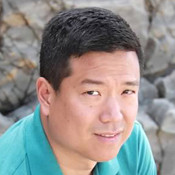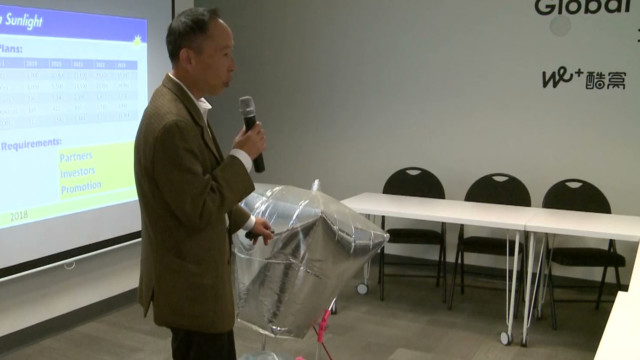Startup pitch competitions are a popular way to get noticed and sometimes receive some extra cash.
But there’s a trend emerging that involves a new prize – gaining access to China. CGTN’s Mark Niu checks out InnoSTARS.
At the InnoSTARS competition in San Francisco, innovation comes in all shapes and sizes – like a solar balloon energy system.
“You can fold the balloon and put it in your pocket,” California Sunlight CEO Bing Gu, pitching before a panel of judges said. “The storage unit mainly is for heating. You collect energy all day long and in the night time use the energy for heating and cooking.”
Robo Bev’s vision is to have subscribers carry their smartcups and get Italian-quality coffee served in seconds at a solar-powered robotic kiosk like this.
“Version 3 has drones that refill the coffee beans and water,” Bev said. “By doing eight trips to the kiosks every day, we can fill both the water and the coffee beans.”
“InnoSTARS is one of several competitions the Chinese businesses community has created in the U.S. and North America to generate interest in China,” John Robinson, principal consultant for InnnoSTARS and Mandarin Environment said. “Competitions are a great way to separate companies that are ready, from companies that still need more time.”
Both the Chinese and US governments support the InnoSTARS competition.
At competitions across seven U.S. states, roughly 40 startups will win an all-expenses paid roadshow trip in China and compete for the chance to be at the grand finale in Suzhou.
Senclo has created this top-rated smarthome garage controller. With the device, it wants to allow garage owners to rent out their space — becoming the airbnb of garage storage.
“We want to explore the possibility to go into the Chinese market as well as investment from Chinese investors,” said Senclo’s CEO Brian Hoang.
“So the technology is usually nothing. They work,” said Robinson. “The question is, are you ready for action in China?”
One candidate is the Utah-based company, IsoTruss, which has developed a carbon fiber based structure that claims to be twelve times stronger than steel.
It’s targeting the China market, which it says has the world’s largest cell tower needs
“If you are going into a city like Shanghai or Beijing, we can put towers on top of buildings without affecting the structural capacity of the building,” Hunter Wixom, Vice President of Business Development at IsoTruss said. “We can put towers in anywhere causing minimal disturbance to the community. And not to mention pollution is decreased, because the Co2 emissions are 70 percent less.”
With a detailed plan to seek out manufacturing and strategic partners in China, IsoTruss is selected by the judges as one of the winners.
“I’m way excited,” said Wixom as he heads to the front of the room to be congratulated. “It’s such an honor.”
 CGTN America
CGTN America

